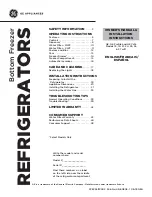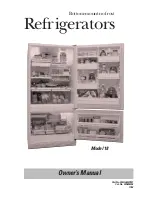
Different storage zones
Natural air circulation gives rise to dif-
ferent temperature zones inside the re-
frigerator section. Cold, heavy air sinks
to the lowest section of the appliance.
Make use of the different zones when
placing food in the appliance.
Warmest area
The warmest area is in the top section
of the door. Use this for storing butter
and cheese.
Coldest area
The coldest area in the refrigerator sec-
tion is normally directly above the vege-
table containers. In this appliance, how-
ever, the coldest area is in the Stayfresh
(0 °C) zone.
Use the coldest areas in the refrigerator
section and in the Stayfresh (0 °C)
zone for all delicate and highly perish-
able food, e.g.
– fish, meat, poultry,
– sausage products, ready meals,
– dishes or baked goods containing
eggs or cream
– fresh dough, cake mixtures, pizza or
quiche dough,
– soft cheese and other dairy prod-
ucts,
– pre-packed vegetables and other
fresh food with a label stating it
should be kept at a minimum temper-
ature of 4 °C.
Do not store explosive materials in
the appliance or any products con-
taining propellants (e.g. spray cans).
Danger of explosion.
If storing alcohol with a high per-
centage proof, make sure it is tightly
closed, and store upright.
Do not store cooking oil in the refrig-
erator door.
Traces of oil can cause stress
cracks to occur in the plastic com-
ponents in the door.
Food must not touch the back wall of
the appliance. Otherwise it may
freeze to the back wall.
Stayfresh (0 °C) zone
A temperature of between 0 - 3 °C com-
bined with a high humidity level pro-
vides the optimum storage conditions
for fresh food, enabling it to be kept
fresher for longer than in the refrigerator
section.
The freshness of food when first placed
in the appliance is an important factor
in determining how long it stays fresh.
Bear this in mind when shopping.
The temperature in the Stayfresh (0 °C)
zone is automatically held at approx.
0 °C.
Using the refrigerator section efficiently
13














































